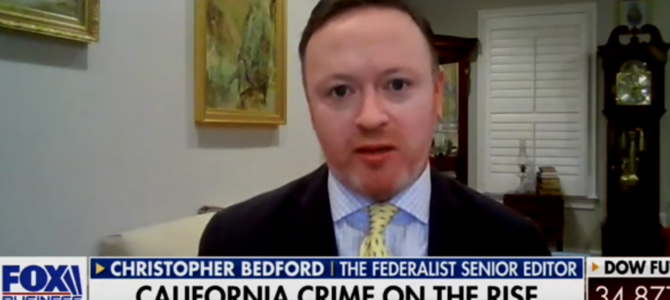Federalist Senior Editor Christopher Bedford said leftist officials refusing to crack down on the spike in violent crime in American cities will inevitably lead to more suffering and harsher policing.
“This is getting out of control,” Bedford explained. “It’s spilling out of the poor neighborhoods. It’s spilling out of the places that are far outside where the white liberals and their allies, or whatever else you want to call them, live, and into the Nationals ballpark, and into attacking senators. It‘s out of control.”
If this upward trend in crime continues, Bedford noted, others, such as Former California Democrat Sen. Barbara Boxer, who was assaulted and robbed in Oakland on Monday, will suffer.
“Thank God the senator is okay because she’s an 80-year-old woman now getting punched in the back and robbed. In the city of Oakland, you have carjackings up 90 percent, murders up 20 percent. And at the same time that the Biden administration sent $190 million to the city of Oakland to help it out, they cut $18 million from their police force. Their police chief is out there begging and saying, ‘I know these people who are being gunned down.’ The City Council called them speed bumps and just things that were going to get in the way.”
Even when police chiefs in Oakland and Washington, D.C., speak out about the difficulties they are having with cracking down on crime, their cries for help seem to fall on deaf ears of those who continue to lobby for the release of criminals and softer sentencing.
“The recidivism rate for them involving violent crime is through the roof and they’re being released within days,” Bedford said. “We’ve gotten rid of bail. We’ve gotten rid of harsh sentencing. We’ve gotten rid of a willingness to enforce the law here in Washington, D.C., and across the country. In the 1950s, the 1960s, we were the softest country in the West on crime. Because of that, crime spiked. We ended up with a bigger criminal justice and a bigger prison system that the activists have ever tried to reform in the first place.”
"We've gotten rid of bail. We've gotten rid of harsh sentencing…In the 50s, 60s we were the softest country in the west on crime. Because of that crime spiked. We ended up with bigger criminal justice, a bigger prison system than the activists have tried to reform." @CBedfordDC pic.twitter.com/waGdkUb4Ww
— The Federalist (@FDRLST) July 27, 2021
Despite voters’ desires to put “crime prevention and safety and more police at the absolute top of their list of things,” some cities are slower to act than others, leaving vulnerable people in their wake and the potential for “excesses” in criminal punishment.
“We know how to solve this. We solved it after the ‘50s in the ‘60s. We solved it in this country. We had one of the safest countries in the West because of that, but that came with harsh policing. I think we’re going to see a return,” Bedford said. “If we don’t turn it around sooner than this, then I worry that we’re going to see some of the excesses that we saw in crime and punishment in the ‘90s because people get so fed up and so angry that they end up hurting innocent people in the round-up of criminal abusers.”









